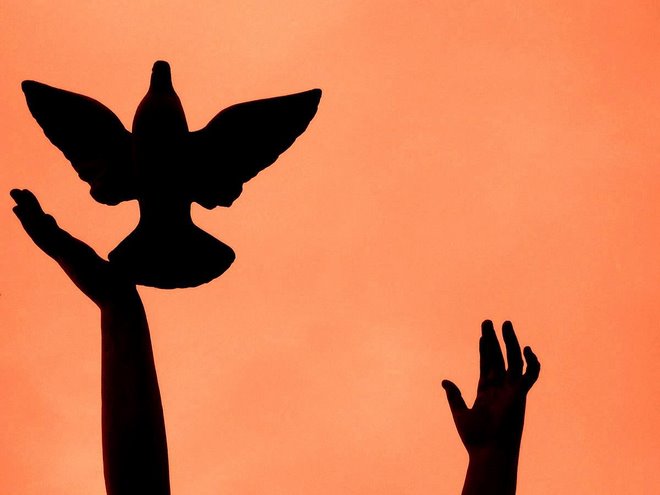Sunday:
Actually...
It's allergy season here in Chico, and I've been sniffing and sneezing worse than I have in many years. This has started several interesting conversations about sneezing (see, there can be a positive side to anything!). Did you ever think that saying “Bless you” is limited to one or a few cultures? Actually, although it seems like a strange custom, most languages have a phrase that others can say to the sneezer (though not all languages have one, for example Japanese does not). In English we say “Bless you!” or “God bless you!” There are two explanations for this. The more interesting explanation is that during the Middle Ages it was believed that when someone sneezed it meant that a demon was trying to get into their soul through their mouth. So “God bless you” was a protection against demons. Also, during the Bubonic Plague a sneeze could be a sign of fatal illness, and so “God bless you” was a blessing for health.
I looked over a list of about 50 different languages, and only a few didn't fit into these two styles: health or spiritual protection, which actually have obvious connections themselves. But there are also some other interesting customs. In Puerto Rico, the first sneeze is responded to with "Salud" (Health), but it is also common for someone to reply to a 2nd sneeze with "Dinero" (Money) and after a 3rd sneeze "Amor" (Love). In Romanian, sneezing is usually followed by replying "Noroc", ("Good luck"). Several languages have responses that wish the sneezer 100 years, for example Polish ("Sto lat" = “hundred years”), Chinese ("bai sui" = "(may you live)one-hundred years"), and Tamil ("Nooru" = “Blessing to live more than 100 years”). Czechs usually use the phrase “Na zdravy” (to your health), but sometimes say “to je pravda” (it is true!). When a Dutch person sneezes three times in succession it is seen as a sign that the weather tomorrow will be good. And speaking of signs, in ancient Greece sneezing was seen to be a sign of approval from the gods. There is even a historical record of the Greek Xenophon going confidently to war because one of his soldiers sneezed while he was promising that they would win. By contrast, in some parts of South India there is a superstition that it is a bad omen if someone sneezes just before someone is leaving on an errand or journey. Consequently, if someone sneezes people often wait for some time before beginning their intended mission.
Many languages also have nursery rhymes about sneezing, for example this Spanish one:
“One sneeze: “Salud” (To your health)
Two sneezes: “Salud y dinero” (To your health and wealth)
Three sneezes: “Salud, dinero y amor” (To your health, wealth and love)
Four sneezes: “Salud, dinero, amor, y alergias” (To your health, wealth, love, and allergies)”
Anyway, all these above make some time of sense to me, but the one I can't quite figure out is the widespread idea that you sneeze when someone is talking/thinking about you. This is a common idea in China, Japan, and India (and if I remember correctly, in Czech Republic, but that might have been about yawning. Any comments from the Czechs?). My Japanese friend Megumi tell me that one sneeze means someone is speaking positively about you, two sneezes means someone is speaking negatively about you, and three sneezes means that you're cold. The Chinese say “yǒu rén xiǎng nǐ ” (有人想你), which translates into "someone is thinking about you". Okay, everyone from cultures that have this idea, I'm curious about the history of this idea. Any thoughts?
Well, that was enough information to make anyone's nose tingle! Now you're prepared to sneeze almost anywhere! So, blowing on to the next item!
Monday:
On A Personal Note:
While riding my bike home last week, I was hit by a leaf. Seriously, I was just riding along, thinking about nothing much and minding my own business, when out of nowhere something large suddenly struck me in the face. I was so surprised (and a little off balance) that I quickly stopped my bike and took a moment to figure out what had happened. My reaction for a second was anger. When I realized that it was a leaf that had fallen from the tree just in time for my face to intercept it, I started laughing. The fact that I'd been ambushed by a leaf was funny! And that got me thinking... why did my feeling change almost instantly from anger to laugher just because it was a leaf? After all, if a person had suddenly come and hit me, I wouldn't be laughing. Okay, there is a difference in pain levels. So let's say that some kids are on the side of the street, and as I'm riding by they throw a big leaf at me and it hits me on the face (okay, use your imagination a little here). The pain level and effect would be exactly the same, but I would be angry, not laughing. And in another example, what if that leaf fell from the tree, but the surprise made me fall off my bike, and I scrapped the skin off my knees and hands? I think I would still be laughing when I realized what happened. Whining like a baby, yes, but still laughing about getting beaten up by a leaf. Hmm, interesting picture.... Anyway, regardless of pain levels, the reactions to being hit by a leaf or a person are very different. So what's the difference?
For me, this experience is about the power of intention. We don't get angry with inanimate objects like we do with animate ones. Inanimate objects can cause problems, but they can't intend to cause problems. This implies a lot of different things. It means that when we want to blame someone (or something), we must find something that intended to hurt us. If a wall falls on a man and cripples him, he won't blame the wall. He'll blame the wall builder, or the person leaning on the other side of the wall, or even the termites in the wall. If that person really needs someone to blame, and can't find any other possibility, then he will blame God before he blames the wall itself. We need to see intention.
The ramifications and revelations of this experience go on and on, and I can see myself starting to write an essay on this, so I'm going to stop here before things get too scattered. Let me know what you all think about this!
Tuesday:
Singapore is recognized as being the cleanest city in the world. Because of the abhorrence of gum spots, chewing gum is illegal unless it is nicotine gum (after all, the only habit messier than chewing gum is smoking cigarettes). Not flushing a public toilet is a crime. In 1994 a 18 year old boy named Michael Fey was living with his mother in Singapore. With some friends one night he went on a spree of spray-painting cars and egging houses. Once caught he was sentenced to four months in jail, a $1,400 fine, and six lashes on his bare buttocks with a rattan cane. The lashing punishment is extremely severe, as the first lashes usually strip the skin from the victim's back. President Clinton even got involved and tried to convince the Singapore Chief of Justice to remove the lashings from the punishment, unsuccessfully. But the number was changed from 6 to 4. After the punishment Michael Fey was treated for emotional distress but not for the pain. He'll have a scarred back for life. Think about that the next time you think of littering!
Wednesday:
World Problems:
Nigeria, on the central west coast of Africa, is one of the world's most populated countries, with 130 million people. It's also one of the richest and poorest countries in the world, depending on where you look. As a country it is rich with oil. Oil represents 80% of the nation's total revenue. In 2005 this came to $60 billion. The problems are twofold:
First of all, the oil infrastructure covered 159 oilfields, uses 4,500 miles of pipeline, and uses 275 flow stations, where massive gas flares burn day and night. The Nigerian government documents 6,817 spills, practically one oil spill every day for the last 25 years. Outside agencies estimate that this number might actually be 10 times as much. The oil fields are in a delta region once rich with fish and fertile agriculture. While it used to be a very easy to get food for the natives, today it is virtually impossible to survive as a farmer or fisherman, and masses of frozen fish are shipped in the delta area.
The second problem is that virtually none of this money helps the common people. In 2003 the Nigerian anti-corruption agency estimated that 70% of government oil revenues was stolen or wasted by government officials. And if a government agency is saying that, you have to wonder if it's not more than 70%! While billions of dollars are flowing into Nigeria, still almost all of the 30 million people who live on top of the oilfields live on around a dollar a day.
Now evaluating the situation according to income is dangerous. Often we see “poverty” and think “oh, they don't have electricity so they must be miserable,” but in fact they can be much happier without our sense of materialism. However, this is not one of those cases. After a number of famous protesting Nigerian writers were hung by the government, the people became so desperate that they decided that violence is their only option. A young Nigerian university lecturer said “we have to carry weapons unless we want to die. Violence begets violence.” The military has been instructed to “meet force with force” to protect the oil companies, and quickly the Nigerian delta has become one of the most dangerous places on earth. In just one example last year, an Italian construction worker was kidnapped from a bar in a village of about 3,000 people. The army responded by burning the entire village to the ground. The Italian was released five days later for a large ransom.
Thursday:
Wow!
The new American Washington dollar coin will have the phrase “In God We Trust” written on the edge of the coin instead of the face, like almost all other US coins. The last coin to have printing on the edge was the 1933 gold “double eagle” $20 coin, which is among the rarest coins in the world. In 2002, a gold double eagle coin sold for $7.59 million – the highest price ever paid for a single coin.
Friday:
Say What?!
In 1928, after the disappointments of the Pact of Paris following WWI, US Secretary of State Frank Kellogg (yes, of the Kellogg cereal family) got an interesting idea from a university professor named James Shotwell. According to Shotwell, the way to stop war was to make it illegal. Kellogg liked the idea, and, with the French foreign minister Aristide Briand, drafted the Kellogg-Briand Pact. They invited all other nations to sign the treaty, and all but five countries in the world signed it in August 1928. Interestingly enough, the treaty is still in effect, which means that war is still illegal.
Saturday:
Questions:
What makes the difference between a person who sincerely cares about other people, and a person who doesn't?
Last Week's question and response: “I'm trying to understand if materialism is so strong in the West because we want thing more than other people, or just because we have more opportunity to get things. Do all people want “stuff”? Have you ever met a person who did not have some desire for material possessions? Please tell me about them!”
Answer from Luke Ogden in Germany: Yes, I've been to a few monasteries of different sorts and have met monks who seriously don't want material possessions. For example I met some hard core ascetics at a small Serbian Orthodox monastery (in the hills in Northern California) who live with only the most basic necessities, which does not include things like electricity or hot water. They spend most of the day every day singing a cappella solo and praying. In any case, they certainly aren't interested in "stuff" or acquiring material possessions. Traditionally, monasticism includes the renunciation of personal property, and nothing at a monastery is the property of one individual.
Welcome to the Penguin's world! Come in and Discover!
Hello friends! I hope you enjoy looking around my blog. I'm planning to keep it updated with pictures, stories, and news of my latest experiences... but since I'm not having too many extreme adventures lately, I'll keep you informed regarding what I'm learning. Very interesting stuff! At least, I think so. I've realized more and more how huge the world is (I know, cliché, but REALLY!), how much cool stuff there is to discover, and what a waste it would be if I just sat back and lived out my life. This blog is an attempt to keep my eyes open, and I hope it will inspire everyone who reads it to do the same. Each week I'll post a list of seven things I discovered about the world that week, and you can check them out on the right in the "Discover Something New" section, or just scroll down to see the most recent one. I hope you find them as fascinating as I do!
As for the Penguins, well, if you don't know what that's about, then I probably don't know you well enough for you to be on my blog! Scat!
For everyone else, Quack Quack, and enjoy. :-)
-Caleb
Subscribe to:
Post Comments (Atom)



6 comments:
Caleb,
where did You find the text about 'Rising dove'? I like it.
Blue Elephant
Hi Blue Elephant! Actually, I wrote it. Sorry to disappoint you if you were hoping to read the novel it came from or something. :-) See, I was giving that butterfly picture to a friend for his wedding, and wanted to explain why I was giving them that picture and what I thought about it. Took a lot of drafts, but I think I got it. I'm really happy with how the photograph, message, and idea go together. Thanks for asking!! -C
Oops! I just took another look at your question. I was talking about the butterfly text at the beginning of the blog, and you somehow found the dove text at the bottom. Anyway, the story is about the same, I wrote the text in response to the picture. It's probably one of the most minimalist pictures I've ever taken, but it's always been one of my favorites for the emotion it emotes. Ta!
Cool! I thought it´s from some book. Where have You inspired yourself to write it? I´d hang the picture with text on my wall as a poster or when I´m thinking of it now it may be pretty on
t-shirt. I´ve got in my dom´s room big poster sticked on the door. Imagine a piece of the beach and the sea, at the bottom there´s a man looking toward the sea, having his arms widely spread, the football is lying nearby. The whole picture is coloured into brown-orange. I like the title
"Every Dream Has A Beginning". Isn´t it stupid? Just I like it.
Blue Elephant
It's funny (and encouraging) that you say that. I've been working on making a portfolio of my photographs to try to sell them, and I realized that I could make my pictures different than all the thousands of other digital photographers by writing on the pictures. I've got a little talent in photography, and a little talent in writing, and so together it could be very appealing! And hey, feel free to save the picture and print it for your wall! I think it would go very well with the "dream" poster.
Hey, do I know you? I feel like I should know the name "Blue Elephant," but I honestly can't remember. Anyway, thanks again for being interested! -C
Yes, You should know me, that´s true. From the beginning I thought You knew but then I started to doubt. And my feeling was right.
Think! Blue Elephant called Penguin - who would be so crazy to give the elephant so unusual name? You! You did it. That elephant was mine. I am the person who You know very well. I hope You aren´t disapointed.
Blue Elephant
Post a Comment